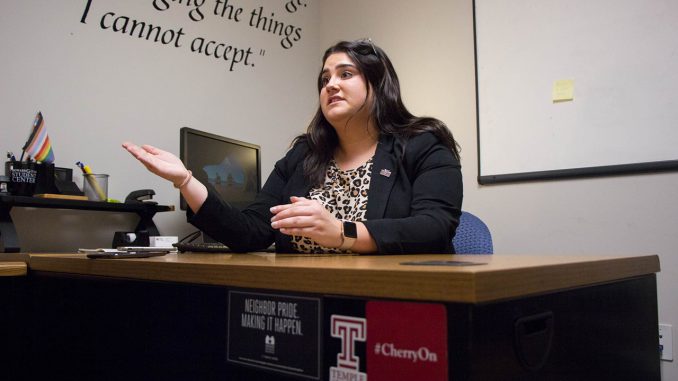
This academic year, Temple Student Government is implementing “out-of-office hours,” which requires directors in the executive branch to attend at least one student organization meeting a week to boost outreach.
The current administration campaigned on the policy based on criticism from students that TSG was a “faceless organization,” said Student Body President Francesca Capozzi.
“We didn’t like that reputation that Temple Student Government had,” Capozzi said. “We act as the liaison between students and the administration, which means that students should definitely feel comfortable to come to us and talk to us about anything that they feel is a concern or an issue or even something good that’s going on on Temple’s campus.”
Every director has attended meetings of approximately 25 organizations in the past two weeks, according to a list from Jess Torres, TSG’s director of communications.
But three leaders of the listed organizations told The Temple News that they had no recollection of TSG members attending their meeting in an official capacity.
“That’s not true,” said Mckenzie Morrisey, the STARS director with the Black Student Union. “You would’ve noticed if someone from TSG was there.”
Sariyah Andrews, the president of BSU, said that Natalia Garay, TSG’s director of student affairs, did attend one of their meetings, but as a representative of Queen In You, the campus organization she is president of, and not TSG.
Garay said that she attended the BSU meeting as a representative of both Queen In You and TSG and that she’s attended meetings of the Progressive NAACP and S.M.O.O.T.H. Inc., among others, in her TSG capacity.
“Normally, when I go to different organization meetings, I count it as an hour of out-of-office hours,” Garay said. “But if I’m asked in the capacity of Queen In You, it depends on the event.”
“Let’s say, for instance, the BSU event, because I knew that they were talking about things that had to do with student concerns, I kept both hats on,” she added.
Some directors may not have attended their chosen organization’s meetings in full or not have talked to every leader in an organization, which could explain why some organization leaders did not notice them, Capozzi said.
“This is still a really early initiative,” Capozzi said. “So working out the kinks, letting our directors know the reason that we really want to have these office hours is so that they can connect with these students to make sure their voices are heard.”
Capozzi is considering requiring directors to fill out more detailed post-meeting reports, she said.
“It’s important that there’s some accountability factor that also allows us to then reach out again to these organizations and make sure their concerns or questions were heard or answered,” Capozzi said.


Be the first to comment